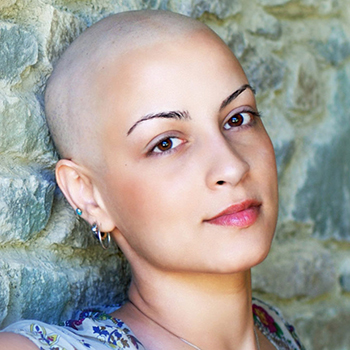Is Hair Loss a Symptom of Cancer?

While hair loss is synonymous with cancer in many cases, this is not exactly the truth. Cancer itself, does not impact hair loss. However, the treatments associated with hair loss, including chemotherapy and radiation, are both known to increase the likelihood - or even directly cause - hair loss. So, although cancer doesn’t directly cause hair loss, it does lead to hair loss if treated severely and is often associated with hair loss symptoms.
Hair Loss and Chemotherapy
Hair loss is a common side effect associated with chemotherapy treatments. This occurs because chemotherapy drugs, which are very powerful, not only target cancer cells but other rapidly reproducing cells in the body. In many cases, hair follicles fall under this category and are one of the main things that is targeted by the chemotherapy treatment drugs.
As patients undergo chemotherapy treatment, they are likely to experience hair loss. The nature and severeness of the hair loss is dependent upon a number of factors, including the type of cancer, the type of treatment, and the individual circumstances of the patient. For some, hair loss will be swift and nearly total, while others will experience loss of hair over time and in specific areas.
What You Can Do About It
Although there isn’t much you can do to combat hair loss due to chemotherapy, there are things you can do to prepare and as alternatives:
One way of preparing for the change is to try a shorter haircut beforehand. By getting used to the short due, you’ll be ready for having shorter hair. This will also make an easier transition when the time comes and your hair loss begins.
You can also consider getting a wig. Depending on your needs, you can potentially match it to fit your preferred style. For some people, this can help you restore confidence so that you can function as you regularly would. If you want to match your regular hair style and appearance, that can be done; if you want to try completely new looks with wigs, you can do that as well.
Alternative fashion options, like scarves and hats, can be used to help you cover up your hair loss and create stylish alternative looks. If you find wigs uncomfortable, itchy, or simply don’t like them, scarves and hats can be great ways of adding style and a unique character.
Overcoming Hair Loss
Despite options to help with hair loss, nothing can grow your hair back or negate the negative effects and implications of hair loss in terms of its emotional and personal impact. Hair loss, especially sudden, severe, or permanent in nature, is very difficult to deal with and has many connotations associated with it. People often experience lower levels of confidence and self-worth, since they are affected by the hair loss they experience.
Trying some of these alternatives may help you feel more secure about yourself and confident in your appearance. Either way, understanding that hair loss is directly caused by treatment may help you understand and cope with your hair loss.

